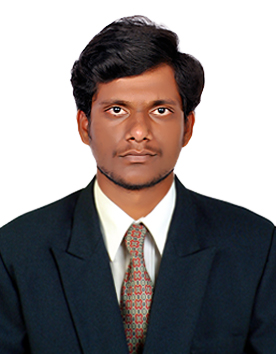VUNNAVA DINESH BABU
@chec.ac.in
HOD CSE
CHEBROLU ENGINEERING COLLEGE
EDUCATION
M.Tech(
RESEARCH INTERESTS
Artificial intelligence
depp learning
machine learning
Scopus Publications
Scholar Citations
Scholar h-index
Scopus Publications
Vunnava Dinesh Babu and K. Malathi
Elsevier BV
Vunnava Dinesh Babu and Karunakaran Malathi
Institute of Advanced Engineering and Science
<span lang="EN-US">Large datasets have become useful in data mining for processing, storing, and handling vast amounts of data. However, handling and processing large datasets is time-consuming and memory intensive. As a result, the researchers adopted a partitioning strategy to improve controllability and performance and reduce the time and memory required to handle large datasets. Unfortunately, the numerous clustering techniques available in the literature could confuse experts in choosing the best techniques for a given dataset. Furthermore, no clustering technique can tackle all problems, such as cluster structure, noise, or density. To manage large datasets, existing clustering techniques need scalable solutions. Therefore, this paper proposes an ensemble partition-based clustering with a majority voting technique for large dataset partitioning using the aggregation of k-means, k-medoids, fuzzy c-means, expectation-maximization (EM) and density-based spatial clustering of applications with noise (DBSCAN) techniques. These techniques cluster the large dataset individually in the first stage. The final clusters are discovered in the next stage through a majority voting technique among the five clustering algorithms. These five clustering algorithms assigned data instances to the cluster with the most votes. The experimental findings demonstrate that the ensemble partition-based clustering method surpasses the other five clustering algorithms in terms of execution time and accuracy.</span>
Dasari Ashok, Neelam Mary Vijaya Nirmala, D Srilatha, K Venkateswara Rao, Vunnava Dinesh Babu, and Shaik Johny Basha
IEEE
Citrus plants cannot develop quickly due to illnesses of the fruits and foliage. Therefore, creating a computer-based citrus fruit/leaf disease detection system is crucial. Artificial Intelligence (AI)-based computerized citrus fruit/leaf recognition is now possible because of Machine Learning (ML) and Deep Learning (DL) algorithms. Timely issue detection is essential for growers of citrus plants to avoid impeding their development or even preventing citrus plant mortality. It will be easier for agricultural workers to quickly remove citrus plant illnesses if the software is developed that autonomously recognizes them. In this study, a CNN-LSTM is used to create a detection model of citrus plant illnesses that divides images of diseased citrus leaves into two categories: unhealthy and healthy. Further, hyperparameters like optimizers and Learning rates are adjusted to get maximum accuracy. The results are analyzed, interpreted, and tabulated in this work. The maximum accuracy of the CNN-LSTM model is obtained at a learning rate of 0.001 and by using the Adam optimizer. The maximum accuracy achieved by CNN-LSTM is 96.8% which is better than state-of-the-art approaches. Finally, it is concluded that the CNN-LSTM model is better at identifying citrus leaf diseases efficiently. The CNN-LSTM model is a successful method for differentiating between healthy and diseased citrus leaf images in terms of accuracy findings.
Dinesh Babu Vunnava, Ramesh Babu Popuri, Ravi Kiran Daruvuri, and Anusha B
IEEE
Epilepsy is a brain disorder that results in abnormal electrical activity in the brain. Epilepsy is also called a seizure disorder. The diagnosis of epilepsy can be made if the person suffers from two or more seizures. Seizures are the main symptom of epilepsy. Different models are introduced to diagnose epileptic seizures with the help of electroencephalography (EEG). EEG is wavelet signals that are most widely used to find the abnormal events identified in the brain. Deep Learning (DL) algorithms can efficiently discover epileptic seizures based on their features. In this study, an automated epilepsy seizure detection system (AESD) is developed to diagnose and detect epilepsy seizures from the human brain. A pre-trained DL model VGG-19 is used to train the EEG sample datasets. VGG-19 helps to extract the features of ECG samples and transfer the data to the proposed approach for better outcomes. The existing models analyze many challenges to seeing this disease. The dataset attributes include patient family history, age, and information about medicines that have been used for a long time. The experiments use Python libraries for DL algorithms, such as Keras, Pandas, Matplotlib, and Numpy. The performance of the proposed approach is analyzed based on parameters such as accuracy, sensitivity, specificity, and F1-score.
Vunnava Dinesh Babu and K. Malathi
Springer Science and Business Media LLC
Vunnava Dinesh Babu and K. Malathi
IEEE
Nowadays, deep learning (DL) is blueprint for the machine learning (ML). Compare with NL, DL is most efficient, time and with low cost There are no limitations for the learning approaches in DL. DL algorithms can extract high-quality of features based on the dataset provided. Due to the fast development in internet technology, huge data is started processing by dividing according to the requirements. DL algorithms are more compatible for processing of huge and complex datasets such as pattern matching, recognition of handwriting, recognition of speeches, analysis of stock markets and many more. DL has more advancement on various applications and this will solve various issues in complicated pattern applications. Previously, datasets such as handwritten is used to find the accurate result with the Ensemble novel classifier (ENC). But this not worked up to the mark. In this paper, dynamic deep learning algorithm (DDLA) is designed and developed to process the complicated and complex datasets. This is the combination of Auto Encoder (AE) and Adaptive Convolutional neural network (A-CNN). Experimental results show the performance of the EDDLA with ENC.

